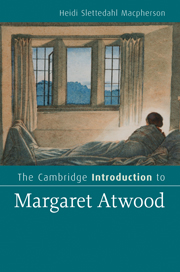Chapter 4 - Critical reception
Published online by Cambridge University Press: 05 June 2012
Summary
As early as 1968, Atwood's poetry was catching the attention of literary critics such as W. H. New (who later became editor of Canadian Literature), though in an early survey of Canadian literature, she merited only a footnote. By the early 1970s, however, her poetry was featuring more prominently in reviews of Canadian literature, and, by the middle point of that decade, her novels had begun to receive sustained attention, too, and she was the subject of a special edition of The Malahat Review, a prominent Canadian literary journal.
From the first, critics have been interested in her depictions of female bodies and quests, power and gender politics, and her use of language. Carol P. Christ, for example, examined Surfacing as a spiritual quest only a few years after the novel was published. Atwood herself gave ‘A Reply’ to critics, including Christ, who were exploring Surfacing in an early volume of the feminist journal Signs, setting out her by now familiar views that literature is literature, not a treatise, and not a direct reflection of reality. However, her work has been consistently seen as referring to the world around her, whether that world is specifically associated with Canada, or whether it is more concerned with contemporary gender relations or with other political positions.
1970s and 1980s
What becomes obvious very quickly in reviewing the criticism on Atwood is the fact that the majority of Atwood scholars take a feminist approach, and this might be in part because she began writing at a time of raised feminist consciousness.
- Type
- Chapter
- Information
- The Cambridge Introduction to Margaret Atwood , pp. 111 - 120Publisher: Cambridge University PressPrint publication year: 2010

